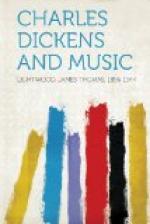Words and music by G. Linley.
Tho’ lost to sight,
to mem’ry dear
Thou ever wilt
remain,
One only hope my heart can
cheer:
The hope to meet
again.
THROWN ON THE WIDE WORLD (O.M.F.)
See p. 133.
TIME OF DAY (S.B.C. 8)
See p. 92.
’TIS THE VOICE OF THE SLUGGARD (M.C.
9)
Dr.
Watts.
’TWAS EVER THUS FROM CHILDHOOD’S HOUR (O.C.S. 56, D.C. 38)
(’Oh ever,’ &c.)
Words by Moore.
From ‘Lalla Rookh.’ Has been set
to music by S. Glover,
E. Souper, and Verini.
VILLIKENS AND HIS DINAH
Sung by Mr. Robson and by S. Cowell.
Composer unknown. A very popular song 1850-1860.
It’s of a liquor merchant who in London did dwell,
He had but one darter, a beautiful gal.
Her name it was Dinah, just sixteen years old,
And she had a large fortune in silver and gold.
To my too-ral-lal loo-ral-li loo-ral-li-day.
WAPPING OLD STAIRS (U.T. 3)
J.
Percy.
WEEP FOR THE HOUR (O.M.F.)
See p. 133.
WE MET (O.C.S. 36, S.B.T. 11)
T.H.
Bayly.
The story of a girl who was compelled by her mother to jilt her true love and marry some one else. The story ends with the words misquoted by Swiveller:
The world may think me gay,
For my feelings I smother—
Oh! thou hast been the cause
Of this anguish, my mother!
WE’RE A’NODDIN’ (B.H. 39)
Anonymous.
A once popular Scotch song.
O we’re a’ noddin,
nid nid noddin,
O we’re a’ noddin
at our house at home;
How’s o’ wi’
ye, kimmer? And how do ye thrive,
And how many bairns hae ye
now? Bairns I hae five.
WE WON’T GO HOME TILL MORNING (P.P. 7)
Said in the London Singer’s Magazine (c. 1839) to be written and composed by C. Blondel (’adapted and arranged’ might be more correct). The tune is founded on an air known as Malbrough, or Malbrook, which originated during the Duke of Marlborough’s campaign, 1704-1709, known as ’The War of the Spanish Succession.’
WHAT ARE THE WILD WAVES SAYING?
Words by J.E. Carpenter. Stephen Glover.




